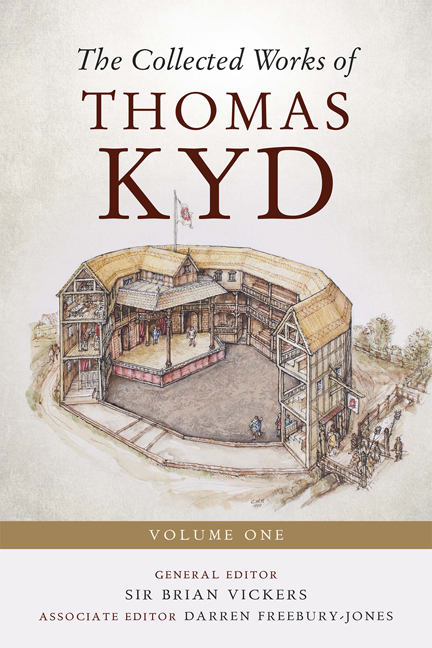Recognizing Kyd
Published online by Cambridge University Press: 16 May 2024
Summary
When I first started working on Thomas Kyd, some twenty years ago, I had no thought of enlarging his canon. My goal was to better understand his masterpiece, The Spanish Tragedy (written c. 1585, published 1592). I also studied the two other plays of accepted authorship, Soliman and Perseda (written c. 1588, published 1592), and Cornelia, translated from Garnier's Cornélie and published posthumously in 1594. Having a naturally inquisitive mind, I studied reference books and annual bibliographies to discover secondary literature on Kyd's life and works. As I worked through these sources, I noticed that other plays had been attributed over the years, some repeatedly, others only once or twice.
The play most often ascribed to him was Arden of Faversham, first made in 1903 by that knowledgeable scholar Charles Crawford, who in 1908 compiled by hand a Concordance to Kyd's three acknowledged plays. Crawford had great expertise in identifying unattributed excerpts, as he showed in an exemplary edition of the 1600 verse anthology England's Parnassus (Oxford, 1913), in which he was able to identify over 3,000 of the quotations from anonymous poets and dramatists. His interleaved copy of another verse anthology, Bodenham's Belvedére (1600), identifying over 2,000 of the anthology's 4,400 quotations, has recently been published. The fact that a scholar with these abilities ascribed Arden of Faversham to Kyd is of considerable significance. Crawford's pioneering identification was soon followed by the dissertation of Walter Miksch on ‘The Authorship of Arden of Faversham’, in which Miksch accepted Crawford's attribution while adding many new matches between the play and Kyd. There were other contributions, English (H. Dugdale Sykes) and French (Felix Carrère), until in 1948 the great Danish scholar Paul Rubow, in his study of ‘Shakespeare and his contemporaries’, settled the attribution by listing over a hundred verbal matches with Kyd.
The documentation in that paragraph will surprise many modern readers, who only know the attribution made by MacDonald Jackson in numerous publications over the last fifty years, according to which Shakespeare wrote scene 8. Jackson dismissed Crawford, unfairly, and completely ignored Rubow, even though M. L. Wine, in his Revels edition of Arden – Jackson's preferred text – frequently cited Rubow in his commentary and included many of his identified Kyd matches in an appendix.
- Type
- Chapter
- Information
- The Collected Works of Thomas Kyd , pp. 39 - 50Publisher: Boydell & BrewerPrint publication year: 2024



